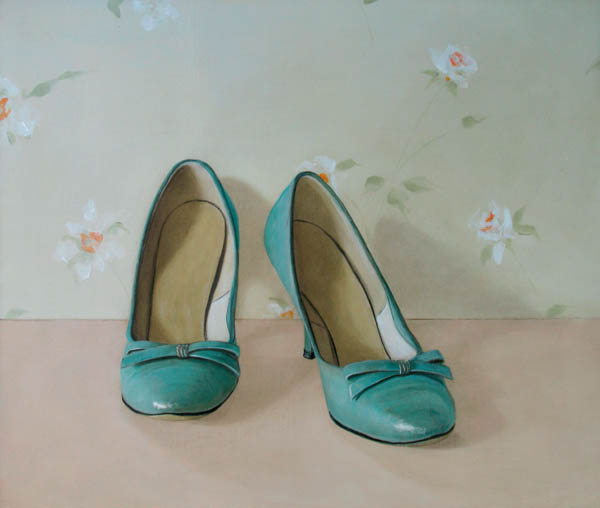Vintage, everyday, domestic objects—each one like the portrait of a lovely character instead of just a simple still life. Toronto-based artist Holly Farrell is a self-taught painter. Prior to becoming a painter, she worked with teenagers who had developmental and psychological challenges. At the same time, in the late 1980s, she and her mother started to experiment with just about any form of craft—an excellent way for them to bond, and for Holly to alleviate the stress that resulted from her day job. But after a while she wanted something that was all her own, and just before she turned thirty, she tried painting. She avoided formal art classes because she wanted to find her own footing, and, more interestingly, she found the thought of being around other artists very intimidating. Thankfully, she put her insecurities about not being formally trained aside, and she now makes a successful living, very skillfully layering oils and acrylics on panel.
JC—When did you feel like you had truly become an artist?
HF—It was most likely my first show, which was at the Toronto Outdoor Art Exhibition in 1992. It’s a juried show, and the fact that a group of “actual” artists felt my work was good enough to be included in the exhibition was exciting. That didn’t last very long. . . . the next day I went back to worrying about people thinking I was a charlatan because I had no training. I sold my first paintings at this show but was determined to become a better painter. I decided I was going to hone my drawing skills—I felt that to be a better painter I would have to go back to basics and try to remember what I had been taught in high school, and go from there.
JC—What inspires you?
HF—Generally I am inspired by my past, your past, our collective past. This is because I like to paint the familiar. I tend to paint things that make me feel nostalgic in one way or another. It’s not always a positive experience for me—sometimes I paint subjects that are grounded in difficult times from my childhood. I think it’s my way of trying to come to terms with things I had no control over. My father was a violent alcoholic who died from drinking at the age of thirty-nine. My whole life with him was fraught with tension and fear. I think painting things from this time period is a way of working out the bad memories. We lived in a roadside diner/gas station along the highway. I associate the diner with my mother, who was a steady comfort in these tumultuous times, which is probably why I’m drawn to kitchen-related subject matter.
JC—Have you ever abandoned a painting midway through?
HF—I do have a collection of paintings in the basement that have been abandoned. Sometimes I am able to salvage something that’s gone wrong, but I am much more comfortable starting over these days instead of working myself into a lather. I definitely learn from my mistakes and make sure I don’t repeat them on the second attempt—mostly. It’s liberating to make the decision to stop a painting and start over.
JC—Do you ever equate your self-worth with your artistic successes?
HF—Absolutely. It’s only through painting that I have gained any kind of self-worth and confidence. Now, it’s extremely difficult to see myself outside of painting—I suppose I hide behind it in some ways. As I have only found happiness as a painter, I panic at the thought of one day not being able to paint, or one day realizing nobody is interested in what I’m painting. Don’t we all equate our self-worth with how well we perform in our lives, our work, our family? Painting is who I am.
JC—What causes your creative blocks? How do you get through them?
HF—I usually think myself into a creative block when I’m completing one deadline while another one is looming. Once the initial panic recedes I almost always am able to find a focus. I have an entire basement full of “things” I have picked up at antique shows, garage sales, family gatherings (always bought or borrowed), with the intention of one day getting ’round to doing paintings of them. I can go downstairs and root through the boxes and shelves, unwrap the pottery and bowls, or flip through the many books that are piled here and there. I intend to paint my way through it all eventually. I like to feel connected to the subjects that I paint. It’s that connection or reverie that brings me out of any block, or the panic from thinking that I am running out of ideas. I think that my blocks help me evolve in one way or another.

It’s liberating to make the decision to stop a painting and start over.